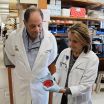(Press-News.org) Babies born prematurely are surviving in increasing numbers. But many withstand complications of early birth only to suffer late-onset sepsis — life-threatening bloodstream infections that strike after infants reach 72 hours of age.
While early-onset sepsis often is caused by pathogens acquired from the amniotic sac or birth canal, the causes of late-onset sepsis have been far less clear.
But now, researchers at Washington University School of Medicine in St. Louis have discovered that preterm babies' guts harbor infectious microbes that can cause late-onset sepsis.
The research is published March 19 in Clinical Infectious Diseases.
"There is a tremendous emphasis in intensive-care units throughout the world on stopping infections related to the insertion of IVs, catheters or other tubes, but that leaves a sizable subset of people who get bloodstream infections from germs that don't necessarily reside on the skin," said senior author Phillip I. Tarr, MD, the Melvin E. Carnahan Professor of Pediatrics. "It's been suspected that these other infections come from the gut. This research proves that."
The researchers, in collaboration with scientists at Michigan State and the University of Minnesota, found three types of potentially harmful gut microbes in the bloodstreams of most babies in the study who developed late-onset sepsis: E. coli, group B strep and S. marcescens.
The findings suggest new strategies to detect and prevent severe bloodstream infections in neonatal intensive care units (NICUs) — and that such strategies include the gut as a target.
The findings also are relevant to other patient populations, said study co-author Barbara B. Warner, MD, a professor of pediatrics who treats patients at St. Louis Children's Hospital.
"Although our study was in preterm infants, its applicability is much more broad and may include people who are susceptible to bloodstream infections, for example, people in intensive care units or with chronic illnesses, or cancer patients who take medicine that may suppress their immune systems," Warner said. "Late-onset sepsis is not just a disease in preterm infants — it's a cause of serious illness and death among many acutely ill and immunocompromised patients."
Sepsis, which contributes to billions of dollars in health-care costs each year, occurs when the immune system has an overwhelming response to a bacterial infection. The body releases chemicals into the blood to fight the infection, but this triggers widespread inflammation that can lead to blood clots and leaky blood vessels. In severe cases, sepsis causes shock, organ failure and death.
It's widely accepted that preterm babies — and patients of all ages — can acquire such infections via IVs, catheters and other tubes. These infections are thought to be hospital-based or otherwise associated with health care.
About 20 percent of preterm babies develop late-onset sepsis. Overall, about 10 to 20 percent of infants whose infections aren't successfully treated with antibiotics die because of the condition. This death rate varies according to the bacteria causing sepsis; some gut organisms result in higher death rates, in the range of 20 to 30 percent.
The Washington University investigators, including first author Mike A. Carl, a medical student at Saint Louis University, studied 217 premature infants from whom they collected all stool samples, beginning as soon as possible after birth. The babies had been admitted to the NICU at St. Louis Children's Hospital, which has stringent infection-control practices and sepsis rates that fall below the national average. Still, at or after three days of age, 11 of the infants developed sepsis.
The researchers, working with scientists at The Genome Institute at Washington University School of Medicine, used genome sequencing to compare bacteria in the blood samples of the 11 affected infants with bacteria found in their stool samples, which are a proxy for microbes in the lower intestine, or gut. To assess whether sepsis-causing infections spread between infants, the scientists also compared stool-based bacteria with bacteria in stool samples from two groups of infants without sepsis.
In seven of the 11 infants who developed sepsis, the researchers found that bacteria in stool samples taken days to weeks before the onset of sepsis matched bacteria in the blood samples taken later, suggesting that bacteria from the gut – rather than from other parts of the body – quite likely caused the bloodstream infection.
"We obtained the organism from the blood and then isolated the organism from the stool and then sequenced both," Warner explained. "We could tell, because the sequences were genetically identical, that the source of that organism was the same in the blood as what was in the stool."
They also found the same microbes in the stool samples of infants whose NICU stays overlapped, suggesting that such bacteria occasionally are transmitted from infant to infant, though the bacteria don't always lead to illness.
"No one can be completely sterile; it is inevitable that bacteria will be encountered by infants in these settings," said Tarr, who is also a professor of molecular microbiology. "We do not know the origin of these bacteria in most cases. However, this study tells us that at least in a subset of infants who develop bloodstream infections, the germ that invades their blood flourishes in their gastrointestinal tracts for at least a few days before it causes sepsis.
"That's an opportunity to be on top of colonization and to be aggressive in preventing dissemination between infants in NICUs and within infants who are colonized. The concept of sepsis as gut infection offers a new strategy to prevent this serious, hospital-acquired condition independent of assiduous skin care, which we continue to endorse."
Warner stressed that the findings indicate a need to consider infection-control steps outside of those taken regarding the insertion of IVs and other tubes into patients. "We could be spending millions of dollars to decrease line-related sepsis, but health-care and infection-control experts haven't addressed this other component," she said. "Considering our findings, this should be looked at more broadly and more intensively."
INFORMATION:
Carl MA, Ndao M, Springman AC, Manning SD, Johnson JR, Johnston BD, Burnham CD, Weinstock ES, Weinstock GM, Wylie TN, Mitreva M, Abubucker S, Zhou Y, Stevens HJ, Hall-Moore C, Julian S, Shaikh N, Warner BB, Tarr PI. Sepsis from the gut: The enteric habitat of bacteria that cause late-onset neonatal bloodstream infections. Clinical Infectious Diseases. March 19, 2014.
This work was supported by grants from the National Institutes of Health (NIH grant numbers UH 3AI083265, U54 HG004968, AFRI-AI10903, P30DK052574; the Office of Research and Development, Medical Research Service, Department of Veterans Affairs (grant 1 I01 CX000192 01); the Infectious Diseases Society of America Medical Scholars Program; the Global Alliance to Prevent Prematurity and Stillbirth, an initiative of Seattle Children's Hospital and the Bill & Melinda Gates Foundation; and the Melvin E. Carnahan Professorship.
Washington University School of Medicine's 2,100 employed and volunteer faculty physicians also are the medical staff of Barnes-Jewish and St. Louis Children's hospitals. The School of Medicine is one of the leading medical research, teaching and patient-care institutions in the nation, currently ranked sixth in the nation by U.S. News & World Report. Through its affiliations with Barnes-Jewish and St. Louis Children's hospitals, the School of Medicine is linked to BJC HealthCare.
Gut bacteria can cause life-threatening infections in preterm babies
2014-03-19
ELSE PRESS RELEASES FROM THIS DATE:
Drinking alcohol several times a week increases the risk of stroke mortality
2014-03-19
Consuming alcohol more frequently than twice a week increases the risk of stroke mortality in men, according to a study carried out at the University of Eastern Finland. The results show that the effects of alcohol are not limited to the amount consumed, but also the frequency of drinking matters. The results were published in Acta Neurologica Scandinavica on 8 March.
Excessive consumption of alcohol is associated with a variety of different diseases. The relationship between alcohol consumption and ischaemic stroke shows a J curve pattern, which means that in people ...
GPS also helps to analyze global water resources
2014-03-19
This news release is available in German. FRANKFURT. WaterGAP (Water Global Assessment and Prognosis) is a hydrological model used to model water shortage, groundwater depletion, and floods and droughts (e.g. as impacted by climate change) over the land area of the globe. The Frankfurt hydrologist Prof. Petra Döll has examined how good a fit this model provides, using GPS observations and data from the GRACE satellite, which measures the gravitational field of the Earth. The study, published in the current issue of the scientific journal Surveys in Geophysics indicates ...
Rewrite the textbooks on water's surface tension
2014-03-19
Researchers from the University of Melbourne and University of Sydney are confident their new reaserach results will make significant differences to the calculations of surface tension of water used by the next generation of atmospheric scientists, biophysicists and engineers of technology like inkjet printers.
These latest investigations have clinched a long-standing controversy amongst the physical Chemistry community; the air-water interface is negatively charged by the adsorption of hydroxide ions.
Prof Angus Gray-Weale from the Chemistry, Department of Chemistry ...
Ottawa researchers find new pathway connected to type 2 diabetes
2014-03-19
Ottawa, ON, March 19, 2014 — Scientists at the Children's Hospital of Eastern Ontario (CHEO) Research Institute have discovered a cellular pathway that is responsible for keeping blood sugar levels low in obese or pre-diabetic people, and may prevent the onset of Type 2 diabetes. The discovery published this month in a leading journal Nature Cell Biology.
Following a meal, beta cells found in islets of the pancreas secrete insulin that helps to store food energy for future use. The inability of islet beta cells to produce enough insulin leads to diabetes. Unlike other ...
Postoperative cognitive dysfunction
2014-03-19
Older persons, in particular, tend to suffer from memory lapses and other types of cognitive impairment after undergoing surgical procedures (postoperative cognitive dysfunction, POCD). Surgery has been performed on older patients much more commonly in recent years than ever before, and their pre- and postoperative care has become an important matter. Ingrid Rundshagen, an anesthesiologist, has surveyed the available literature to find out what kinds of patients are more likely to have cognitive impairment after surgery, and how the clinical manifestations should best be ...
Diversity in UK gardens aiding fight to save threatened bumblebees, study suggests
2014-03-19
The global diversity of plants being cultivated by Britain's gardeners is playing a key role in the fight to save the nation's threatened bumblebees, new research has revealed.
Ecologists at Plymouth University, in a study published this week, have shown the most common species of bumblebee are not fussy about a plant's origin when searching for nectar and pollen among the nation's urban gardens.
But other species – and, in particular, long-tongued bees – do concentrate their feeding upon plants from the UK and Europe, for which they have developed a preference evolved ...
EU could afford to lead international climate action
2014-03-19
Major emitting countries may have to join the EU's effort much earlier to avoid a temporary overshoot of the 2 degree target, but even if they joined only in 2030, the overshoot would be limited to roughly 0.2 to 0.4 degrees Celsius. The initial unilateral leadership could be achieved at little extra costs for the EU. Late-comers would have the benefit of lower costs while they delay action but would face higher transient costs once their turn to decarbonize comes.
"The crisis-stricken EU is asking itself whether it can still afford climate leadership" says lead-author ...
Rush to prescribe: Study questions speed in giving antidepressants to grieving parents
2014-03-19
TALLAHASSEE, Fla. — Some doctors are too quick to prescribe antidepressants to parents who have suffered the death of a child either during pregnancy or within the first month of life, according to a study conducted by Florida State University researcher Jeffrey R. Lacasse.
In a study of 235 bereaved parents participating in an online support community, Lacasse found that 88 — or 37.4 percent — of them were prescribed a psychiatric medication to help them cope. Some women received prescriptions with a week of losing their children.
"This is simply too soon after the ...
Global attack needed to catch credit thieves
2014-03-19
EAST LANSING, Mich. — Stopping massive data breaches like the one that hit Target will require a more sophisticated, collaborative approach by law enforcement agencies around the world, a Michigan State University cyber security expert argues.
In a new research report for the National Institute of Justice, Thomas Holt found many hackers and data thieves are operating in Russia or on websites where users communicate in Russian, making it easier to hide from U.S. and European authorities. All countries need to better work together to fight hacking and data theft campaigns, ...
Pocket diagnosis
2014-03-19
A recently-developed mobile phone application could make monitoring conditions such as diabetes, kidney disease, and urinary tract infections much clearer and easier for both patients and doctors, and could eventually be used to slow or limit the spread of pandemics in the developing world.
The app, developed by researchers at the University of Cambridge, accurately measures colour-based, or colorimetric, tests for use in home, clinical or remote settings, and enables the transmission of medical data from patients directly to health professionals.
Decentralisation ...




